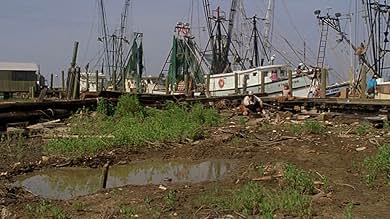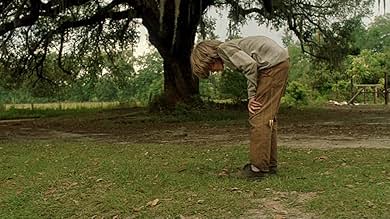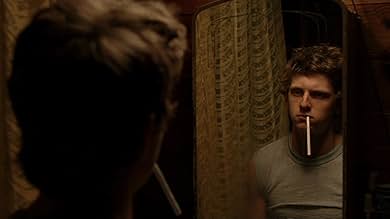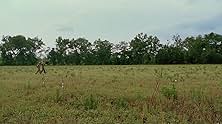NOTE IMDb
6,5/10
9,5 k
MA NOTE
Situé dans une région du Sud américain où le temps semble s'être arrêté, il raconte l'histoire de deux frères qui s'enfuient de chez eux en gardant un secret après la mort de leur père et l'... Tout lireSitué dans une région du Sud américain où le temps semble s'être arrêté, il raconte l'histoire de deux frères qui s'enfuient de chez eux en gardant un secret après la mort de leur père et l'arrivée de leur oncle gênant et cupide.Situé dans une région du Sud américain où le temps semble s'être arrêté, il raconte l'histoire de deux frères qui s'enfuient de chez eux en gardant un secret après la mort de leur père et l'arrivée de leur oncle gênant et cupide.
- Réalisation
- Scénario
- Casting principal
- Récompenses
- 3 victoires et 6 nominations au total
Leigh Higginbotham
- Muriel the Cashier
- (as Leigh Hill)
Avis à la une
In the country of Drees County, the widow hard worker John Munn (Dermot Mulroney) lives in a simple rural isolated property with his rebel and troubled son Chris (Jamie Bell) and his sick son Tin (Devon Alan) and no friends. When his brother Deel Munn (Josh Lucas) unexpectedly arrives in his house on probation, John welcomes him. However, the real intentions of Deel lead the family to a tragedy, forcing the boys to leave home.
"Undertow" is a low paced movie, with a short story, great development of characters and excellent performances. There are no big surprises along the story and in spite of the introduction of the film inducing that it is based on a true event, I have not found any reference in Internet about this murder. My vote is seven.
Title (Brazil): "Contra Corrente" ("Undertow")
"Undertow" is a low paced movie, with a short story, great development of characters and excellent performances. There are no big surprises along the story and in spite of the introduction of the film inducing that it is based on a true event, I have not found any reference in Internet about this murder. My vote is seven.
Title (Brazil): "Contra Corrente" ("Undertow")
7OJT
Talented filmmaking from director of Pianapple Express, with a disturbing underlying nerve right from the start. The story evolves around two brothers growing up in a poor, rural farming environment in the southern part of Georgia. Troubles comes when the convicted brother of the father of the boys turned up unexpectedly, looking for some hidden gold coins.
It's a well told story, a southern tragedy, with great acting from the entire cast. The underlying terror of the past is haunting in this piece of good film making. The story is perfectly told, but if something's lacking here, it's the final pull of interest. But it's beautiful, sad and heart wrenching from a lesser fortunate part of USA.
Well worth a watch, if you don't expect a masterpiece, but a good film.
It's a well told story, a southern tragedy, with great acting from the entire cast. The underlying terror of the past is haunting in this piece of good film making. The story is perfectly told, but if something's lacking here, it's the final pull of interest. But it's beautiful, sad and heart wrenching from a lesser fortunate part of USA.
Well worth a watch, if you don't expect a masterpiece, but a good film.
A teenage boy smashes his would be girlfriend's window and gets chased by the cops. He leaps out of a barn and lands on a plank driving a long nail through his foot but surprises us by keeping on running, howling with pain, plank and all. When he's taken to jail he's patched up and released and given the plank back. When he gets home he carves it into a birthday present, a toy airplane for his little brother. This is how this movie begins.
"Undertow" takes place in an unnamed rural part of Georgia near water where at first we meet two boys, Chris and Tim Munn (Jamie Bell and the young Devon Alan) who live on a small isolated pig farm with their moody father, John Munn (Dermot Mulroney), a widower who's buried himself in this far off place because he can't deal with his wife's passing. (The Munns, the opening titles tell us, were real people in Georgia and this is based on their lives.) Suddenly John's brother Deel Munn (Josh Lucas) unexpectedly appears, just out of jail and full of anger and envy. Even if the father was edgy with the boys, and Chris was obstreperous and Tim was odd, it was a solid little world, but Deel's presence leads to violence and flight. The action hinges on a set of gold coins that have an almost fairy-tale significance, and the Brothers Grimm were an influence on the story.
Yes indeed: the story. This new movie by much admired young American director David Gordon Green arouses disappointment in some of his fans who miss the quirky, stylized meanderings of his "George Washington" and "All the Real Girls," because "Undertow" moves squarely into the more conventional world of plot and action. Others who like myself admired almost everything about his earlier efforts but their lack of a strong narrative line are glad that this time there is one. But no doubt it comes at a price. There's a tug of war between the old Green and the new one going on.
The movie divides itself into the time leading up to the violence and the period of flight and pursuit that ends in climax and denouement. There are those who say "Undertow" is derived from Seventies thrillers or "The Heart Is a Lonely Hunter" or Terrence Malick, whose producer imprimatur the movie bears. These associations pop up because indeed the story is not brilliantly original, even if the texture and look are as distinctive as those of Green's earlier movies. Two thirds of the way through, "Undertow's" narrative arouses expectations of momentum and suspense that are temporarily disappointed, because in the course of flight and pursuit the movie starts to wander a bit. The idiosyncratic dialogue and fresh characters are what makes Green's work so interesting, but they do slow things down, particularly here. In the end neither the die-hard fans nor newcomers will be completely satisfied. It's his very independence that keeps him from completely pleasing anybody but himself.
Green has gone too conventional in some ways, such as cheesy opening titles and an initial series of attention-grabbing freeze-frames, which also continue to reappear sporadically throughout the picture at random moments. The former amateurishness has been replaced with some pointless over-slickness. The cinematography by Green regular Tim Orr is lovely though, with its rich locales and saturated color.
Green's earlier movies fell flat for me -- "George Washington" was singular and engaging but went nowhere, and "All the Real Girls" had more character development but suffered from bad casting and embarrassing dialogue. At its worst moments, which tended to stick in the mind, both movies seemed like Hallmark cards for rural retards.
But "Undertow" does not disappoint, despite its flaws. It retains the distinctive style. And this time because it's successfully plot-driven from very early on, the meanderings -- having a firm foundation in action and character -- come to seem engaging digressions rather than mere self-indulgence. The stuff about a chocolate cake at Tim's ruined birthday party, Chris's run with the plank stuck to his foot, even Tim's disgusting-seeming habit of eating mud and crud and paint and throwing up, wake you up and make you pay attention because of their particularity. It's true that Lucas and Mulroney are too much the Hollywood hunks, just as Zooey Deschanel in "Real Girls" was too much the Indie pinup queen: Green may still have some problems with casting. But not with Jamie Bell, who's about perfect. And he still stays true to the composite southern milieu he grew up in. The grandparents who appear in the denouement are priceless, like so many of the incidental characters.
Deel's arrival at the farm is electric in its effect. From then on the scene is nothing but tension. Mulroney and Lucas, if we discount the too-perfect hunkiness, make a good pair of brothers. Both are big, physical, attractive men whose faces aren't unalike. Mulroney has sullenness about him; Lucas is edgy and aggressive. It turns out John's late wife was Deel's girlfriend first, and John stole her away from him, so the fraternal conflict was truly primal. Their confrontation makes you realize how successfully violence conveys a sense of structure in any story.
After that, the boys run off pursued by Deel, carrying away the gold coins Deel thinks he should have gotten from his father instead of John. There are hints of "Huckleberry Finn" in the boys' adventures when they go wandering on the run from Deel, while the boys' meditative voiceovers suggest Malick. It's strange that the sickly little Tim is the one who runs carrying the bag that has both his books and the couple dozen gold coins in it. But despite such inconsistencies and the suggestion by critics and viewers that the narrative is hackneyed, the treatment and the mood are pure David Gordon Green.
With this third film his methods finally make sense. Rather than thinking of Seventies actioners and the movie "The Heart Is a Lonely Hunter," you'd do better to refer to Carson McCullers, whose novel that film is based on, or to the stories of Truman Capote or Eudora Welty or William Faulkner, or -- closer to today -- the early novels of Cormac McCarthy; or to the photographs of Ralph Eugene Meatyard or Sally Mann. Like those artists, and unlike any Hollywood director, Green has a rich, particular, overripe, deeply southern vision. The fun is in the particularity -- in the cashier, for instance, who flirts with Deel and chokes on her gum; in her mechanic husband who rambles on about some obscure musical group called the Storics; in Tim's storytelling from his books and the way he is filing them at home according to their smell. "Despite a few narrative confusions," Jonathan Rosenbaum has written of "Undertow," "I found it pure magic." You could be cynical and say it would take magic to justify the confusions. But Rosenbaum isn't far wrong. For whatever faults it has, "Undertow" really sings.
"Undertow" takes place in an unnamed rural part of Georgia near water where at first we meet two boys, Chris and Tim Munn (Jamie Bell and the young Devon Alan) who live on a small isolated pig farm with their moody father, John Munn (Dermot Mulroney), a widower who's buried himself in this far off place because he can't deal with his wife's passing. (The Munns, the opening titles tell us, were real people in Georgia and this is based on their lives.) Suddenly John's brother Deel Munn (Josh Lucas) unexpectedly appears, just out of jail and full of anger and envy. Even if the father was edgy with the boys, and Chris was obstreperous and Tim was odd, it was a solid little world, but Deel's presence leads to violence and flight. The action hinges on a set of gold coins that have an almost fairy-tale significance, and the Brothers Grimm were an influence on the story.
Yes indeed: the story. This new movie by much admired young American director David Gordon Green arouses disappointment in some of his fans who miss the quirky, stylized meanderings of his "George Washington" and "All the Real Girls," because "Undertow" moves squarely into the more conventional world of plot and action. Others who like myself admired almost everything about his earlier efforts but their lack of a strong narrative line are glad that this time there is one. But no doubt it comes at a price. There's a tug of war between the old Green and the new one going on.
The movie divides itself into the time leading up to the violence and the period of flight and pursuit that ends in climax and denouement. There are those who say "Undertow" is derived from Seventies thrillers or "The Heart Is a Lonely Hunter" or Terrence Malick, whose producer imprimatur the movie bears. These associations pop up because indeed the story is not brilliantly original, even if the texture and look are as distinctive as those of Green's earlier movies. Two thirds of the way through, "Undertow's" narrative arouses expectations of momentum and suspense that are temporarily disappointed, because in the course of flight and pursuit the movie starts to wander a bit. The idiosyncratic dialogue and fresh characters are what makes Green's work so interesting, but they do slow things down, particularly here. In the end neither the die-hard fans nor newcomers will be completely satisfied. It's his very independence that keeps him from completely pleasing anybody but himself.
Green has gone too conventional in some ways, such as cheesy opening titles and an initial series of attention-grabbing freeze-frames, which also continue to reappear sporadically throughout the picture at random moments. The former amateurishness has been replaced with some pointless over-slickness. The cinematography by Green regular Tim Orr is lovely though, with its rich locales and saturated color.
Green's earlier movies fell flat for me -- "George Washington" was singular and engaging but went nowhere, and "All the Real Girls" had more character development but suffered from bad casting and embarrassing dialogue. At its worst moments, which tended to stick in the mind, both movies seemed like Hallmark cards for rural retards.
But "Undertow" does not disappoint, despite its flaws. It retains the distinctive style. And this time because it's successfully plot-driven from very early on, the meanderings -- having a firm foundation in action and character -- come to seem engaging digressions rather than mere self-indulgence. The stuff about a chocolate cake at Tim's ruined birthday party, Chris's run with the plank stuck to his foot, even Tim's disgusting-seeming habit of eating mud and crud and paint and throwing up, wake you up and make you pay attention because of their particularity. It's true that Lucas and Mulroney are too much the Hollywood hunks, just as Zooey Deschanel in "Real Girls" was too much the Indie pinup queen: Green may still have some problems with casting. But not with Jamie Bell, who's about perfect. And he still stays true to the composite southern milieu he grew up in. The grandparents who appear in the denouement are priceless, like so many of the incidental characters.
Deel's arrival at the farm is electric in its effect. From then on the scene is nothing but tension. Mulroney and Lucas, if we discount the too-perfect hunkiness, make a good pair of brothers. Both are big, physical, attractive men whose faces aren't unalike. Mulroney has sullenness about him; Lucas is edgy and aggressive. It turns out John's late wife was Deel's girlfriend first, and John stole her away from him, so the fraternal conflict was truly primal. Their confrontation makes you realize how successfully violence conveys a sense of structure in any story.
After that, the boys run off pursued by Deel, carrying away the gold coins Deel thinks he should have gotten from his father instead of John. There are hints of "Huckleberry Finn" in the boys' adventures when they go wandering on the run from Deel, while the boys' meditative voiceovers suggest Malick. It's strange that the sickly little Tim is the one who runs carrying the bag that has both his books and the couple dozen gold coins in it. But despite such inconsistencies and the suggestion by critics and viewers that the narrative is hackneyed, the treatment and the mood are pure David Gordon Green.
With this third film his methods finally make sense. Rather than thinking of Seventies actioners and the movie "The Heart Is a Lonely Hunter," you'd do better to refer to Carson McCullers, whose novel that film is based on, or to the stories of Truman Capote or Eudora Welty or William Faulkner, or -- closer to today -- the early novels of Cormac McCarthy; or to the photographs of Ralph Eugene Meatyard or Sally Mann. Like those artists, and unlike any Hollywood director, Green has a rich, particular, overripe, deeply southern vision. The fun is in the particularity -- in the cashier, for instance, who flirts with Deel and chokes on her gum; in her mechanic husband who rambles on about some obscure musical group called the Storics; in Tim's storytelling from his books and the way he is filing them at home according to their smell. "Despite a few narrative confusions," Jonathan Rosenbaum has written of "Undertow," "I found it pure magic." You could be cynical and say it would take magic to justify the confusions. But Rosenbaum isn't far wrong. For whatever faults it has, "Undertow" really sings.
I recently saw this film after seeing Green's George Washington. While that film was interesting it wasn't fantastic...Undertow is fantastic and more. The plot is simple enough, just a story about two boys and their father living in the backwoods of America when their world is interrupted. The boys' uncle comes to visit, recently out of prison, and life quickly changes for them all and the true beauty of this film comes out. Where many movies fail is in focusing too heavily on the main characters or the action of the story. Undertow makes no such mistakes. In between the more intense scenes we are introduced to the world around our heroes. We meet fully developed characters each of whom could easily fill a movie of their own. Rather than creating a world for us to watch, Green has instead allowed us into a living, breathing world as observers. We don't get explanations for everything, only what we see on the screen. Miraculously, none of these characters slow down the film. They add humor or romance or suspense before we are snapped back to the main story. On top of all that the film is beautifully shot, perfectly acted/cast and the music fits the moods in each scene. There is finally a movie that can thrill us, but still take time to make sure we care and believe in it's world. I cannot recommend it enough, you will not be disappointed.
I'm not sure what world Green will next allow us to enter, but I can't wait.
I'm not sure what world Green will next allow us to enter, but I can't wait.
Taking a pop-culture icon and flipping it on its head is a favorite pastime of young film directors. In 1986 David Lynch took his boy-scout memories and essentially, in his own words, sent "The Hardy Boys" to hell with "Blue Velvet." Likewise, with a bit of Terrance Malick inspired poeticism, director David Gordon Green sends the good old Duke Boys to hell with "Undertow." Josh Lucas is effectively menacing in a "Night of the Hunter" kind of way as the recently released from prison brother of the stoic Dermot Mulroney, who has secluded himself and his two sons from the rest of the world on a hog farm following the death of his wife (whom was previously involved with Lucas' character). Some family folklore involving a hidden stash of gold coins sends Lucas' ex-con on a rampage that ends with the tracking of the young brothers on the run through rural American Gothic hell on earth. There's a lot to fault in a film like this, but also a lot to treasure if you give it the time. Jamie Bell and Devon Alan as the two brothers are very convincing and easy to route for, and some directorial flourishes from Green and nice character acting from Lucas keep the film fresh and original even as it channels past classics from Malick ("Badlands"), Lynch ("Blue Velvet"), and the "Night of the Hunter." There's also a score from my favorite minimalist composer Philip Glass. All in all, not a bad way for a film buff to spend their evening.
Le saviez-vous
- AnecdotesDuring the shooting the scene where Deel drives Chris on the dirt road away from the farm, a police chopper was continually circling the area due to a dead body being found around the area. The cast and crew never saw the actual dead body, however.
- GaffesWhen Chris and Deel go for a drive, the lock button on Deel's door alternates between up and down.
- Crédits fous[at the start of the film] The following film was made with the assistance of the Drees County law enforcement agencies and the surviving family of John W. Munn.
- ConnexionsFeatured in Siskel & Ebert & the Movies: The Best Films of 2004 (2005)
- Bandes originalesMonster in the Canyon
Written by Mitchell Rothrock, Shane Hartman and Scott Nurkin
Performed by The Dynamite Brothers
Meilleurs choix
Connectez-vous pour évaluer et suivre la liste de favoris afin de recevoir des recommandations personnalisées
- How long is Undertow?Alimenté par Alexa
Détails
- Date de sortie
- Pays d’origine
- Site officiel
- Langue
- Aussi connu sous le nom de
- Undertow
- Lieux de tournage
- Sociétés de production
- Voir plus de crédits d'entreprise sur IMDbPro
Box-office
- Montant brut aux États-Unis et au Canada
- 143 597 $US
- Week-end de sortie aux États-Unis et au Canada
- 24 354 $US
- 24 oct. 2004
- Montant brut mondial
- 156 767 $US
- Durée1 heure 48 minutes
- Couleur
- Mixage
- Rapport de forme
- 1.85 : 1
Contribuer à cette page
Suggérer une modification ou ajouter du contenu manquant

Lacune principale
By what name was L'autre rive (2004) officially released in India in English?
Répondre






























